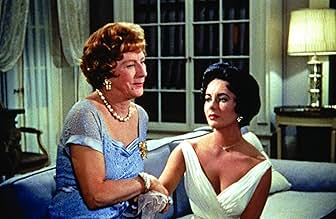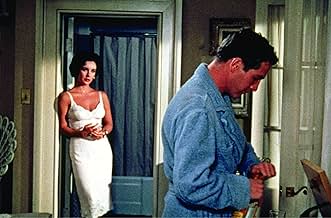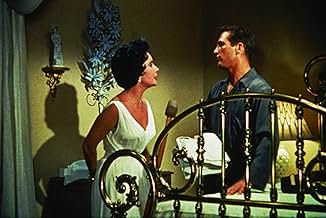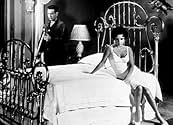VALUTAZIONE IMDb
7,9/10
55.711
LA TUA VALUTAZIONE
Un ex calciatore alcolizzato si riunisce con suo padre che sta morendo di cancro. La loro riunione riporta ricordi e rivelazioni sia per il padre che per il figlio.Un ex calciatore alcolizzato si riunisce con suo padre che sta morendo di cancro. La loro riunione riporta ricordi e rivelazioni sia per il padre che per il figlio.Un ex calciatore alcolizzato si riunisce con suo padre che sta morendo di cancro. La loro riunione riporta ricordi e rivelazioni sia per il padre che per il figlio.
- Regia
- Sceneggiatura
- Star
- Candidato a 6 Oscar
- 3 vittorie e 16 candidature totali
Zelda Cleaver
- Sookey
- (non citato nei titoli originali)
Brian Corcoran
- Boy
- (non citato nei titoli originali)
Hugh Corcoran
- Buster
- (non citato nei titoli originali)
Kevin Corcoran
- Child
- (non citato nei titoli originali)
Patty Ann Gerrity
- Dixie
- (non citato nei titoli originali)
Bobby Johnson
- Pollitt Groom
- (non citato nei titoli originali)
Walter Merrill
- Party Guest
- (non citato nei titoli originali)
Deborah Miller
- Trixie
- (non citato nei titoli originali)
Robert 'Rusty' Stevens
- Sonny
- (non citato nei titoli originali)
Vince Townsend Jr.
- Lacey
- (non citato nei titoli originali)
Recensioni in evidenza
Elizabeth Taylor's death a few days ago prompted me to watch one of her most famous movies.* I've never seen a stage production of Tennessee Williams's "Cat on a Hot Tin Roof", but I will say that the movie version is worth seeing, despite the unrealistic southern accents. The storm taking place outside the mansion is nothing compared to the tension between all the family members gathering for the patriarch's birthday.
As with another notable Tennessee Williams play -- "A Streetcar Named Desire" -- they had to remove the references to homosexuality to bring the movie to the silver screen. Still, the scenes of Maggie (Taylor) in her slip seem as though they would have been risqué for the time. Along with her, just about every character made me feel as if my throat was going to constrict. In a way, it's as if the only truly benign characters were the servants.
All in all, I wouldn't call this movie a supreme masterpiece, but I found it to be worth seeing. This one, along with "Streetcar" and "Baby Doll" are the three great adaptations of Tennessee Williams plays. Also starring Paul Newman, Burl Ives, Judith Anderson (Mrs. Danvers in "Rebecca"), Jack Carson and Madeleine Sherwood (Reverend Mother on "The Flying Nun").
*This is going to sound insane, but prior to "COAHTR", the only movie in which I'd seen Elizabeth Taylor was the god-awful "Flintstones" movie, in which she played Wilma's mother.
As with another notable Tennessee Williams play -- "A Streetcar Named Desire" -- they had to remove the references to homosexuality to bring the movie to the silver screen. Still, the scenes of Maggie (Taylor) in her slip seem as though they would have been risqué for the time. Along with her, just about every character made me feel as if my throat was going to constrict. In a way, it's as if the only truly benign characters were the servants.
All in all, I wouldn't call this movie a supreme masterpiece, but I found it to be worth seeing. This one, along with "Streetcar" and "Baby Doll" are the three great adaptations of Tennessee Williams plays. Also starring Paul Newman, Burl Ives, Judith Anderson (Mrs. Danvers in "Rebecca"), Jack Carson and Madeleine Sherwood (Reverend Mother on "The Flying Nun").
*This is going to sound insane, but prior to "COAHTR", the only movie in which I'd seen Elizabeth Taylor was the god-awful "Flintstones" movie, in which she played Wilma's mother.
This is a fantastic look into a dysfunctional American family, 1950's Style. I was prepared to hate this movie, as I typically don't get into dramas at all. Fortunately, I was completely drawn in. Paul Newman's character (Brick) is enigmatic at best, but somehow, because Maggie the Cat loves him so much and is so utterly devoted to him, you find yourself caring about what happens to him and Maggie both.
Big Daddy and Big Mama both bring back fond memories of my own childhood, and if you grew up in the south, chances are you knew someone like the both of them. Their characters are written and performed so typically Southern, that I realized half way through I felt family connections with the whole family, including the no-neck monsters! Sister Girl is the sister in law from Hades, and her husband needs to dig into her purse for his...manhood. We ALL know a couple like that!
All in all? Elizabeth Taylor, Paul Newman, and Burl Ives are breathtakingly beautiful in their portrayals. This is probably not a good family movie, as Brick has a serious drinking problem and Maggie IS so desperate for his affections, and probably not a good Friday/Saturday night movie, but I still love it, and will think of it fondly for the rest of my life.
It rates an 8.8/10 from...
the Fiend :.
Big Daddy and Big Mama both bring back fond memories of my own childhood, and if you grew up in the south, chances are you knew someone like the both of them. Their characters are written and performed so typically Southern, that I realized half way through I felt family connections with the whole family, including the no-neck monsters! Sister Girl is the sister in law from Hades, and her husband needs to dig into her purse for his...manhood. We ALL know a couple like that!
All in all? Elizabeth Taylor, Paul Newman, and Burl Ives are breathtakingly beautiful in their portrayals. This is probably not a good family movie, as Brick has a serious drinking problem and Maggie IS so desperate for his affections, and probably not a good Friday/Saturday night movie, but I still love it, and will think of it fondly for the rest of my life.
It rates an 8.8/10 from...
the Fiend :.
I have never read or seen the play 'Cat on a Hot tin roof', but after watching the quite superb film, I want to. A movie about families, money, love or lack off. The acting is first rate, Paul Newman and Elizabeth Taylor are superb, if you're looking for laughs, look elsewhere. A classic.
Much has been made of the differences between Tennessee Williams' play and this film--the homoerotic themes have been driven further into subtext (though not eliminated entirely) and a more upbeat ending was added. The changes were necessary when the film was made; although theater and literary purists decry the "sanitizing" or censorship of plays when they are adapted for the screen, in some cases (such as this one) the changes can improve the work in question. "Cat" on film is clearer, for one thing. Tennessee Williams plays tend to be "cluttered" in their original form. They are also cynically downbeat; if that type of story appeals to one, this adaptation might be off-putting.
As with all theatrical adaptations, many of the scenes are excessively talky, especially the Brick/Big Daddy scenes in the second act. Some of the highlights are just as wordy but thoroughly enjoyable rather than tedious (especially Maggie's story about Mae's reign as Cotton Carnival Queen and the entire scene in the basement). All of the performances are excellent, though Paul Newman as Brick is less flashy; it's not really until the basement scene that one feels his talent is given a workout. Elizabeth Taylor is an emotional rollercoaster, venturing from flirtatious to hectoring to wheedling to calm to grasping to tender, often within a single scene, and yet she never slips the rails. Watching films from this period (her career peak), one wonders what happened to turn her into the vague, bleary-eyed woman we see today. Judith Anderson's Big Mama is loud, coarse, and bossy, but completely sympathetic both in the scene with the birthday cake and in the confrontation scene at the end. When Big Daddy invites her along with him at the end, it is every bit as welcome to the viewer as it is to her. Burl Ives is the most towering of all; the emotional growth in the film is as much his as it is Brick's. Jack Carson and Madeleine Sherwood are every bit as good despite being relegated to comic relief at times.
My favorite aspect of this story, however, is the social dynamic. Brick and Maggie are spoiled, young, "beautiful people" who have yet to take on any responsibility, while Gooper and Mae are the epitome of a serious young family. Brick is an alcoholic former football player, while Gooper is a corporate lawyer. Despite these obvious differences, however, both their parents and the audience (and Tennessee Williams, obviously) clearly prefer Brick and Maggie. Every aspect of Gooper and Mae's personalities, even those which bespeak traditional values, are portrayed as petty and unimaginative. Even if one believes that Gooper and Mae have done all the right things, they have done them for the wrong reasons. Thus the theme of the story is most clearly presented: all that is important is to love and to express that love.
As with all theatrical adaptations, many of the scenes are excessively talky, especially the Brick/Big Daddy scenes in the second act. Some of the highlights are just as wordy but thoroughly enjoyable rather than tedious (especially Maggie's story about Mae's reign as Cotton Carnival Queen and the entire scene in the basement). All of the performances are excellent, though Paul Newman as Brick is less flashy; it's not really until the basement scene that one feels his talent is given a workout. Elizabeth Taylor is an emotional rollercoaster, venturing from flirtatious to hectoring to wheedling to calm to grasping to tender, often within a single scene, and yet she never slips the rails. Watching films from this period (her career peak), one wonders what happened to turn her into the vague, bleary-eyed woman we see today. Judith Anderson's Big Mama is loud, coarse, and bossy, but completely sympathetic both in the scene with the birthday cake and in the confrontation scene at the end. When Big Daddy invites her along with him at the end, it is every bit as welcome to the viewer as it is to her. Burl Ives is the most towering of all; the emotional growth in the film is as much his as it is Brick's. Jack Carson and Madeleine Sherwood are every bit as good despite being relegated to comic relief at times.
My favorite aspect of this story, however, is the social dynamic. Brick and Maggie are spoiled, young, "beautiful people" who have yet to take on any responsibility, while Gooper and Mae are the epitome of a serious young family. Brick is an alcoholic former football player, while Gooper is a corporate lawyer. Despite these obvious differences, however, both their parents and the audience (and Tennessee Williams, obviously) clearly prefer Brick and Maggie. Every aspect of Gooper and Mae's personalities, even those which bespeak traditional values, are portrayed as petty and unimaginative. Even if one believes that Gooper and Mae have done all the right things, they have done them for the wrong reasons. Thus the theme of the story is most clearly presented: all that is important is to love and to express that love.
I've got to say that Tennessee Williams' 'Cat On A Hot Tin Roof' was one of the best Newman films. It's one of those movies that grabs your attention in the first 10 minutes. The interactions between the gifted actors and actresses were stupendous. I really felt for Maggie (Elizabeth Taylor) "The Cat ", though and how she was able to keep her composure with her husband Brick Pollitt's (Paul Newman) berating of her. We learn that he was a drunk trying to recapture his glory days of high school sports by leaping hurdles on a track field, dreaming about his moments as a youthful athlete, but suddenly he falls and breaks his leg, leaving him dependent on a crutch. During the film, he has some harsh words for Maggie. I felt that her character was treated unfairly by Brick and to make matters worse, his father Big Daddy (Burl Ives), shows nothing, but contempt for his son that he's even violent towards him. I really understood why he was so angry with Brick and as you watch the verbal fight between the two, you really side with Big Daddy. Newman really was a great actor and was the best choice for this part. Taylor, on the other hand, is a big star And she played Maggie to a T! I really think the Hollywood scripts these days are dead weight compared to the 50s and 60s! The exchanges of dialog and the acting were definitely marvelous. Canadian actress Madeleine Sherwood, who played Mae Pollitt in the film, was the last one to pass away in 2016 at 93! they all left their mark in the acting world.
Lo sapevi?
- QuizDespite being really affected by her husband Mike Todd's death, Elizabeth Taylor resumed her job in a very professional way, without any delay on the set. Everyone was astonished by her determination.
- BlooperAfter Brick tries to drive away and gets stuck, Maggie goes out to him and helps him into the house through the pouring rain. Her hair is soaking wet, but the next time she is seen, it's perfectly dry and styled.
- Citazioni
Harvey 'Big Daddy' Pollitt: I've got the guts to die. What I want to know is, have you got the guts to live?
- ConnessioniEdited into Hollywood: The Dream Factory (1972)
I più visti
Accedi per valutare e creare un elenco di titoli salvati per ottenere consigli personalizzati
Dettagli
- Data di uscita
- Paese di origine
- Lingua
- Celebre anche come
- Un gato sobre el tejado caliente
- Luoghi delle riprese
- Metro-Goldwyn-Mayer Studios - 10202 W. Washington Blvd., Culver City, California, Stati Uniti(studio: made in Hollywood, U.S.A. by)
- Azienda produttrice
- Vedi altri crediti dell’azienda su IMDbPro
Botteghino
- Budget
- 3.000.000 USD (previsto)
- Lordo in tutto il mondo
- 1872 USD
- Tempo di esecuzione
- 1h 48min(108 min)
- Colore
- Proporzioni
- 1.85 : 1
Contribuisci a questa pagina
Suggerisci una modifica o aggiungi i contenuti mancanti




















